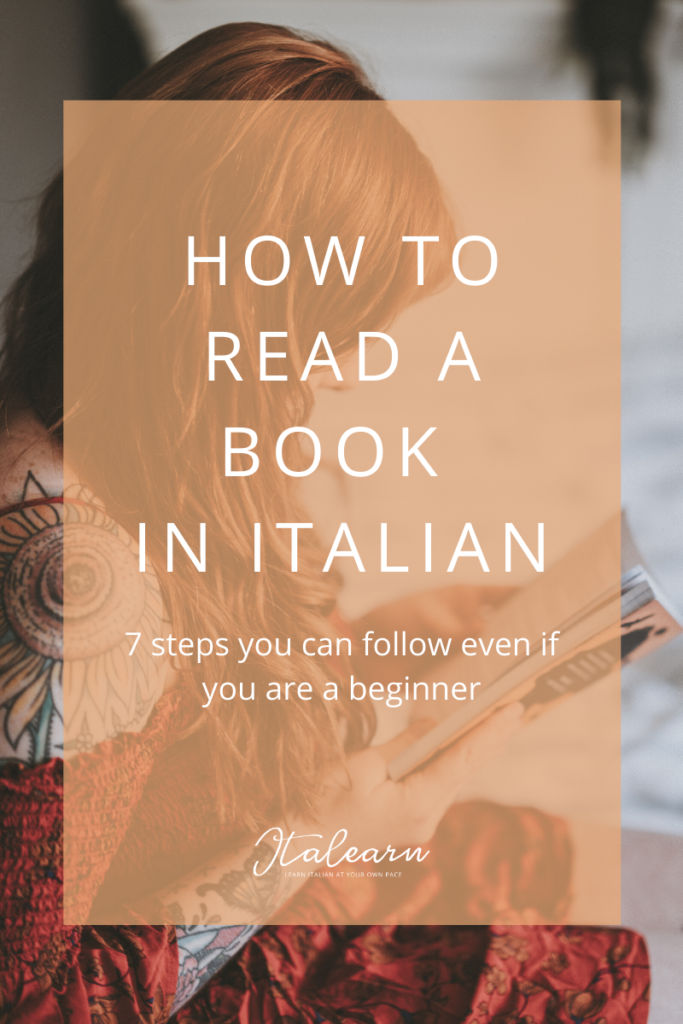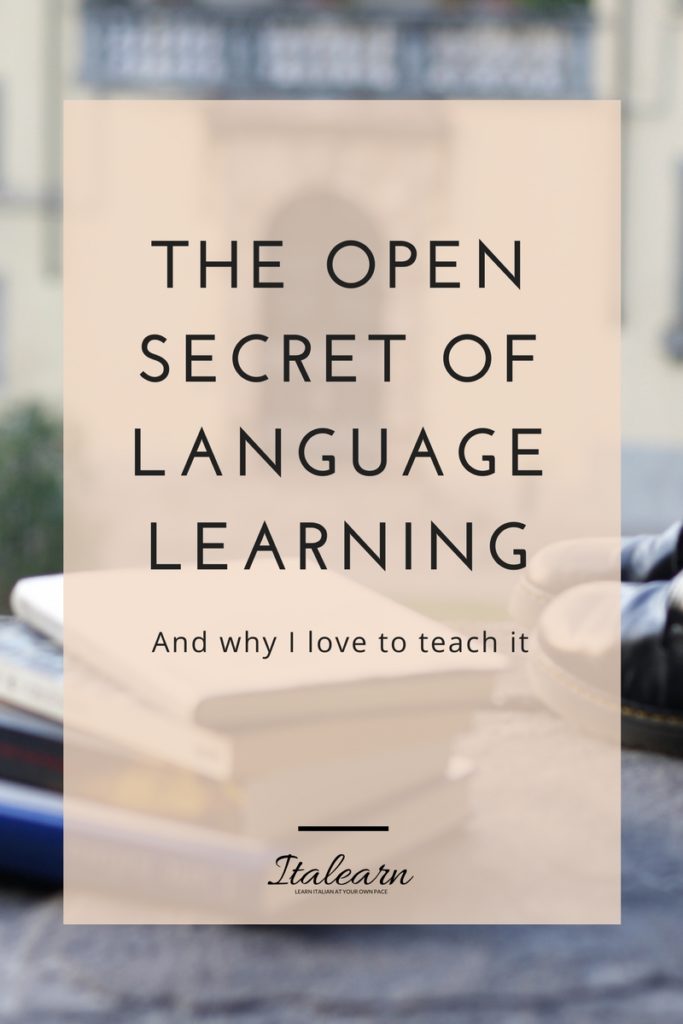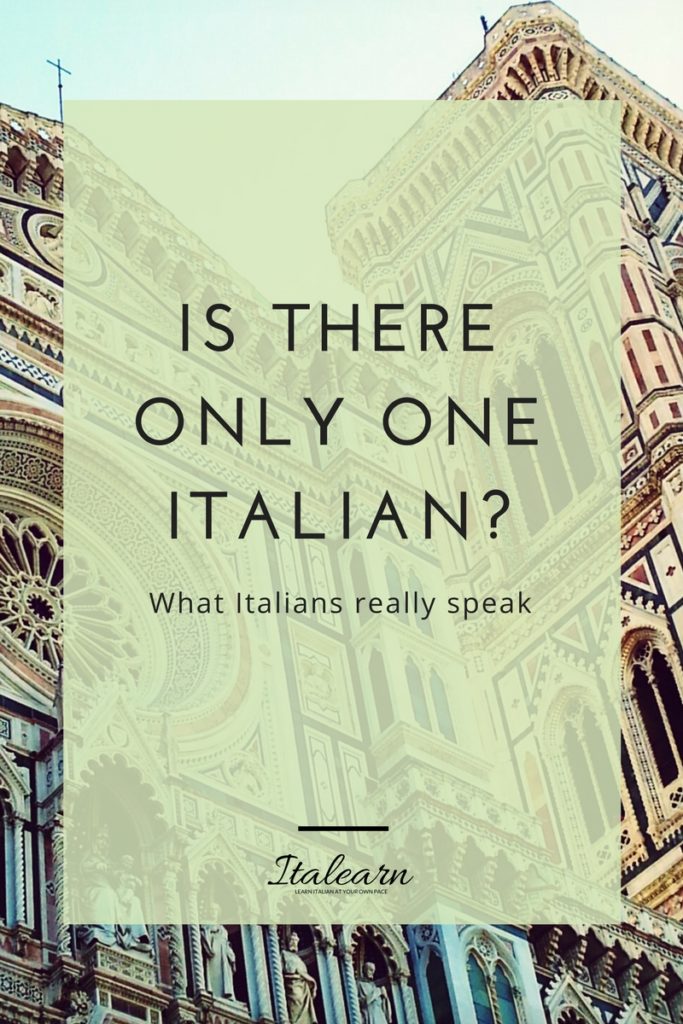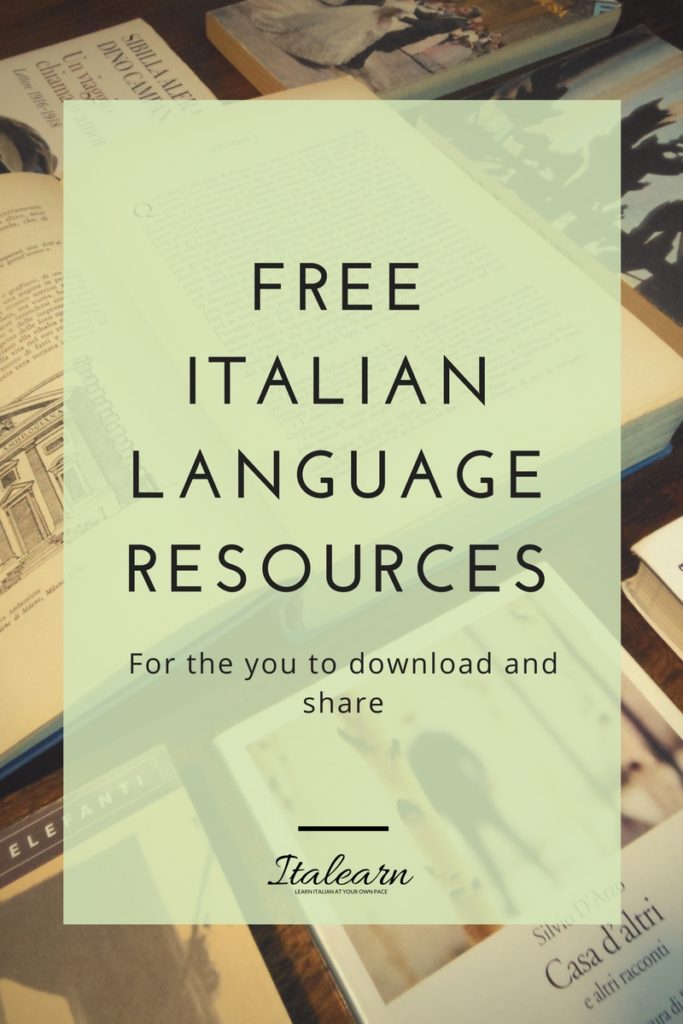Your night table is about to collapse under its own weight. You keep stacking Italian book on top of Italian book because you are going to read them. One day. They won’t be furniture. One day.
I suppose this is how you see it: reading a book in Italian (from the first page to the last) is a goal. So you think that you will need to study a lot before you can be able to read, so it means time will pass, frustration will grow.
It’s certainly more difficult to read if you don’t know many words, but there is a way. I’m not saying it’s going to be easy, but it’s definitely worth doing. Because at the end of the process you have read your book and learned a lot more than just going to class for months waiting to be ready in order to read and studying things that will not help anyway.
Reading a whole book in another language, well “it’s a lot”. I know, it happens to me when I start reading a book in English. Sometimes it feels like an enormous challenge that I don’t want to accept. But then I think about what I’m missing and I start reading.
Change your mindset
I’m going to reveal the big secret straight at the beginning: reading a book in italian is not a goal, it’s a process. If you can make up your mind around this, you are ready to go.
Let’s break this process down into 7 steps that you only need to repeat until you finish your book. But you have to be patient, it’s going to take some time. If you could schedule some time off to read, that would be perfect. Maybe about 30 minutes every time you can (once a week is a great idea).
So keeping in mind that reading a book in Italian is a process and not a goal, here are the things you should do to get it done.
Choose your book
This is a very important step, don’t overlook it. I know that you probably have a favorite book, or author that you really want to read, but you also need to be realistic and not push too far.
So how can you choose the best book for you? Make a list of your want-to-read books and check 2 things: how many pages it has, when it was written.
You need a shorter book to start with because the process is rather long-ish and you don’t want to quit in the middle of it, right?
I also think you should opt for a contemporary book or author because the language has evolved a lot in the last 50 years and what you are studying is the current language.
It’s easier if you read something that won’t have archaic words or sentence structures that are even more difficult to understand — moreover, the italian language, especially written language, can be really complex, with extremely long sentences. And the longer the sentence the more difficult it is to keep track of all the connections.
So my recommendation is to choose a book that you like but that’s rather short and that has been written starting from the 1990s.
Prep work
In this phase you have to find as much information as you can about the book and maybe even about the author.
Why this? Because it helps you to place the story in a context. It will help you with cultural references, with historical references, maybe even with the language.
Read synopsis, summaries, presentations of the story, but not reviews. You are not looking for opinions, you are looking for facts. When and where is the story set, what happened in that city in those years? Who was famous? Who was the president?
Having a context will help you a lot because you will be already immersed in that story.
Also, you will need a notebook and pencil.
select the text to read
I know your instinct will want you to start reading and stop only when your eyes hurt too much to keep them open (at least that’s what happens to me when I love what I’m reading) but you have to resist.
Start with the first page or even just 2 or 3 paragraphs. The work you are going to do in the following steps is intense, so starting small is always a good idea.
First reading
Read your selected text without stopping when you don’t know the words. You don’t need to go fast, as you were scrolling posts on Facebook, take your time.
When you’re done reading take your notebook and write down: who (leave some blank space below) what, when, where. Are you able to get this kind of information from what you have read? Just your ideas, don’t try to dig deep.
Second reading
Now it’s time to do focused work, read again and select all the words you don’t know and phrases that are too hard to understand (maybe you haven’t studied that structure yet, maybe the mood and tense of the verb are new to you).
While you are doing this, you are also actively reading so it’s possible that you are gaining new information, and you probably already understand more than the first reading — even if you haven’t checked your words yet.
Research
This part may be a little long, depending on how many words you need to look up, did you bring your cup of coffee?
Look the words up in the dictionary (I recommend WordReference because it also has a discussion forum and pronunciation) and make sure that you are choosing the correct meaning.
Then simply write it on top of the word — if you don’t want to write on your book, use a post-it (or more) and stick it on the outside border of the page so it is visible while you read.
Final reading
Now that you know all the words and you have a context, read again. This time you are going to really enjoy the chapter and you will get to appreciate the language too. If you find it useful, write down in your notebook the main events from this page so that you always know what’s going on and who’s who and what their role is.
This can help to not overload your brain with excessive information while it has to process the story in the book.
To wrap it up: reading a book in Italian (no matter your current level) is doable.
But you have to be patient, give it the amount of time it needs, no pressure to finish it.
The seven steps I’m suggesting here are a lot of work, I know. But it is invaluable work. You have trained your brain to select information, contextualize it, understand it.
You have learned an incredible number of new words and you also know how to use them. You have read a story that has captivated you (hopefully!) and you have done it on your own.
When the book is finished you have not only reached a goal (through a process that you can re-use for other books) you have lived a life-changing experience. It’s a big word perhaps, but I truly believe that reading changes us and being able to read in another language transports us to another world.
I really appreciate it that you made it to the end of this article, so I want to thank you with the words of Umberto Eco about reading:
“Chi non legge, a 70 anni avrà vissuto una sola vita: la propria. Chi legge avrà vissuto 5.000 anni: c’era quando Caino uccise Abele, quando Renzo sposò Lucia, quando Leopardi ammirava l’infinito… Perché la lettura è un’immortalità all’indietro”
Why don't you start reading in Italian NOW?
There’s no better time than now to start reading a short story in Italian. No, not one of those meh detective stories you read in school. These stories are short but fully Italian-flavored. And the good news is they come with audio, exercises, translation (not a full translation though, you still have to do some work!). Basically, you get enough reading and writing material for 5 lessons with a teacher.




